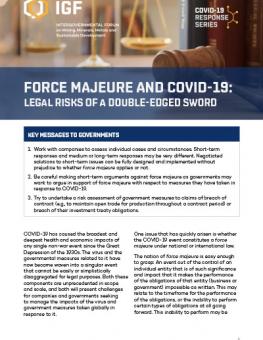
Force Majeure and COVID-19: Legal risks of a double-edged sword
This breifing note offers expert advice for governments on how to approach force majeure claims and defences amid the COVID-19 pandemic.
Key Messages
- Governments should work with companies to assess individual cases and circumstances.
- Short term arguments against force majeure can weaken future government claims.
- Government measures should be assessed for risk of exposure to breach of contract claims or under investment treaty obligations.
COVID-19 has caused the broadest and deepest health and economic impacts of any single non-war event since the Great Depression of the 1930s.The virus itself, and the governmental measures in relation to the virus, have now become woven into a singular event that cannot be easily or simplistically disaggregated for legal purposes. Both these components are unprecedented in scope and scale, and both will present challenges for companies and governments seeking to manage the impacts of the virus and government measures taken globally in response to it.
One issue that has quickly arisen is whether the COVID-19 event constitutes a force majeure under national or international law.
Governments will face claims of force majeure from companies in relation to performing their operations, while in many cases having to make similar legal claims to defend measures they have taken in response to COVID-19. This defense by governments may arise in contract disputes or in the context of investor-state disputes (ISDS) initiated by investors under international investment treaties. This makes force majeure, for many governments, a potential double-edged sword: companies will claim force majeure alleviates them of certain obligations towards government; and governments will claim force majeure alleviates them of certain obligations to private companies.
Participating experts
You might also be interested in
IGF Mining Policy Framework
A compendium of best practices for governments to manage the full range of issues in the mining sector.
The History of the Intergovernmental Forum on Mining, Minerals, Metals and Sustainable Development (IGF)
How did the IGF emerge as the global forum for more than 80 member countries advancing good mining governance for sustainable development?
Artisanal and Small-Scale Mining of Critical Minerals
This report examines the potential for artisanal and small-scale mining (ASM) to take an expanded role in the global supply of critical minerals.
IISD's Best of 2024: Publications
As 2024 draws to a close, we revisit our most downloaded IISD publications of the year.